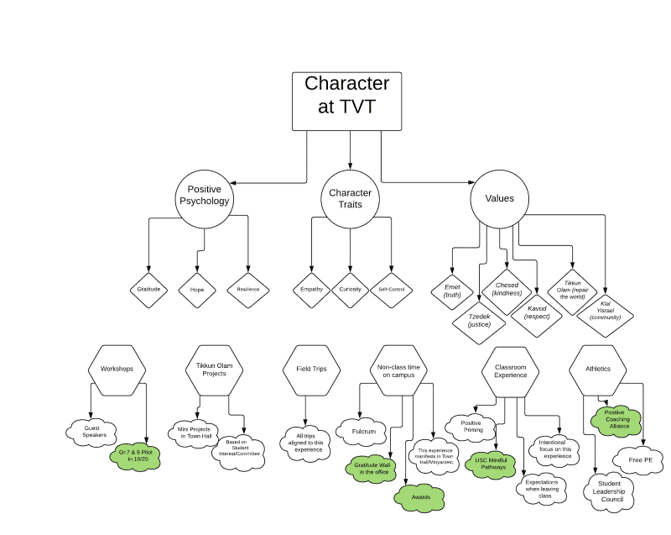
How to Design Professional Development that Staff Want to Attend
August 5, 2019
Technology in Jewish Education: Values and Accessibility
June 3, 2020by JONATHAN M. CASSIE ED.D. and JILL QUIGLEY
Tarbut V’Torah Community Day School (TVT) admits students of other faiths, provided those students were drawn to and inspired by the opportunities afforded to them by being in a learning environment that is informed by Jewish values. Maintaining a school community where Jewish students learn Jewish culture, values and practices alongside students who are not themselves Jewish has not been without its challenges. Because of this, we have committed ourselves to a data-driven approach to learning about our community, rather than an anecdotal one. This has enabled us to move ever more confidently towards fulfilling that aspect of our mission that says, “character is paramount.”
Many tools are available to the school that is interested in undertaking this work. We began by administering two measures – the Mission Skills Assessment (MSA) and the TESSERA. The Mission Skills Assessment, formerly administered by the Enrollment Management Association, has gone out of business, but the TESSERA, which is a product of ACT, is still available to interested schools. The TESSERA measures individual student performance in areas such as Grit, Teamwork, Curiosity, Resilience and Leadership. As of this writing, the TESSERA provides only individual results. TVT also joined a working group of other independent schools in the Pacific region to design a useful and productive dashboard to measure diversity and social-emotional learning. That work is complex and ongoing, but it is our intention to apply this dashboard once it is developed.
While the TESSERA and the MSA were useful, the most useful decision TVT made on this question was to join the Caring Schools Network, an initiative of Harvard University. The Caring Schools Network is a scholarship-informed, research-based, rigorous approach to helping a school better understand the nuances and subtleties of its school culture. The “Making Caring Common Project” of the Caring Schools Network involved administering a survey to our community. Three takeaways for us from our Caring Schools Network report helped stimulate our current approach. First, Caring Schools Network’s survey asks students, faculty and parents about school values and, moreover, asks these groups to say what they value most – achievement, caring or happiness. Where the data was surprising is the degree to which these three constituencies misunderstand what the other two value. There was a sharp misalignment in how students perceived what their parents and teachers valued, but it was no sharper than how faculty misunderstood students and parents or parents misunderstood students and faculty. It has given us a great deal to think about.
Second, the survey asked students about the kinds and frequency of negative experiences they had associated with school. To our delight, the amount of students saying that they never or only rarely had negative experiences was high (above 75% of all students in all cases). To our surprise, online harm/bullying was the least frequently reported issue in our community, causing us to redirect our programming resources away from a focus on online harm to others.
Third, the survey showed that nearly a majority of our students report that they feel stressed or anxious while at school. This, as well as the other two data points, led us to focus on developing character education programs in both our Lower School and in our Middle-Upper divisions.
As a school, we took the broadest approach to character education possible — it was our goal to have “Character @ TVT” infiltrate all aspects of the school day, from the classroom to the courtyard to parent coffees. This approach incorporated positive psychology, traditional character traits and our school’s values. Knowing that success of such a program means making it manageable for faculty and staff to learn and incorporate into their routines and lessons and for students to digest, we defined the three aspects of positive psychology and three character traits that we felt were most relevant to our community based on the data we had gathered — these would now be in addition to the six values that were previously at the core of our “character education.”
Much of the data we gathered from our students indicated an increased amount of stress and anxiety in our students. In the Harvard “Making Caring Common Project” student survey 26% of students agreed that achievement was the top priority of other students, while a full 55% of students reported that they felt stressed or anxious at school. This data led us to choose hope, resilience and gratitude as our focus from the field of positive psychology. It is our belief that when we speak about stumbling blocks to success in very intentional ways that are informed by the studies in positive psychology regarding hope and resilience students’ anxiety and stress will be reduced as they see a clear path forward to success. Knowing that some of our students will continue to struggle even when they are hopeful and are building their resilience, we also focus on gratitude. At every turn, we encourage our students to be mindful of what they are grateful for so that they may become aware that beyond traditional success and among the failures there are still good things happening in their lives.

Figure 1: How TVT operationalizes Character @ TVT
Our choice to focus on empathy, self-control and curiosity from among the many character traits we could have chosen also comes from our data and observations. The Harvard “Making Caring Common Project” student survey indicated that the top three negative experiences students encountered on campus were exclusion, mean names and rumors. To a much lesser extent, discrimination based on race was a concern found in the survey. At a school that embraces the diversity of our student population, any indication of racism was unacceptable. Empathy is the foundation for healthy relationships with friends and peers — if we can strengthen that trait in our students, it will be a short leap to a place where we see especially middle school students exercising self-control over their actions and having a genuine sense of curiosity about students who at first glance seem unlike themselves.
By using data this way, we are confident we know more about our school, and our school community than ever before.
Jonathan Cassie is Director of Curriculum and Innovation at TVT Community Day School in Irvine, CA. His book on game-based learning and gamifed instruction, Level Up Your Classroom, was published in 2016.
Jill Quigley is the principal of the Middle and Upper Schools at TVT Community Day School in Irvine, California. She has dedicated her career to Jewish education, having served in a variety of capacities in Jewish day schools for nearly twenty years.

